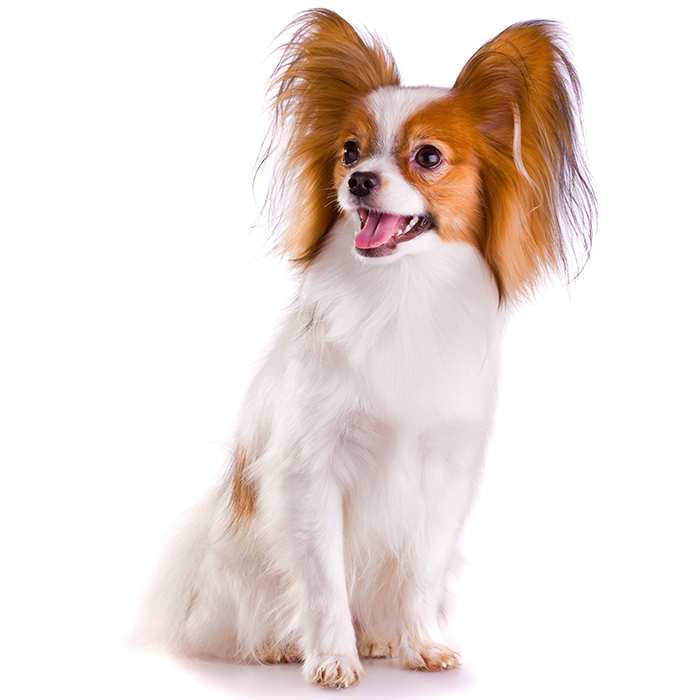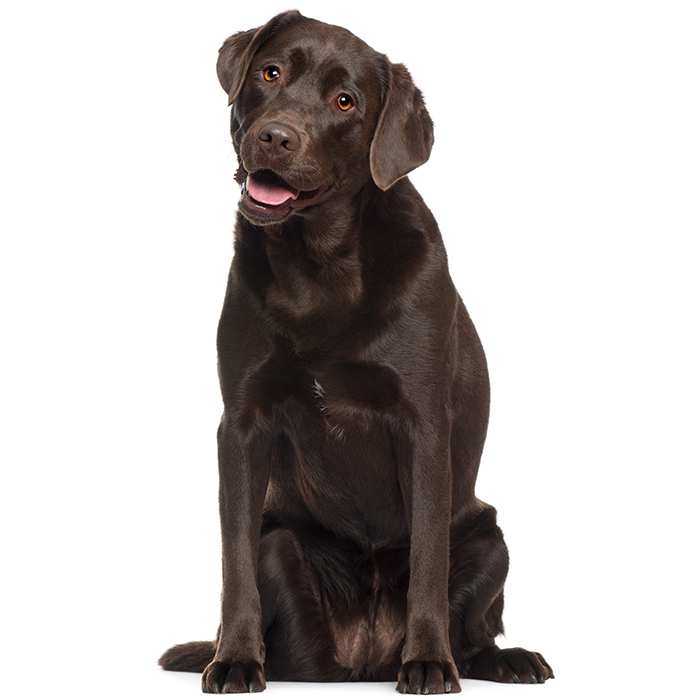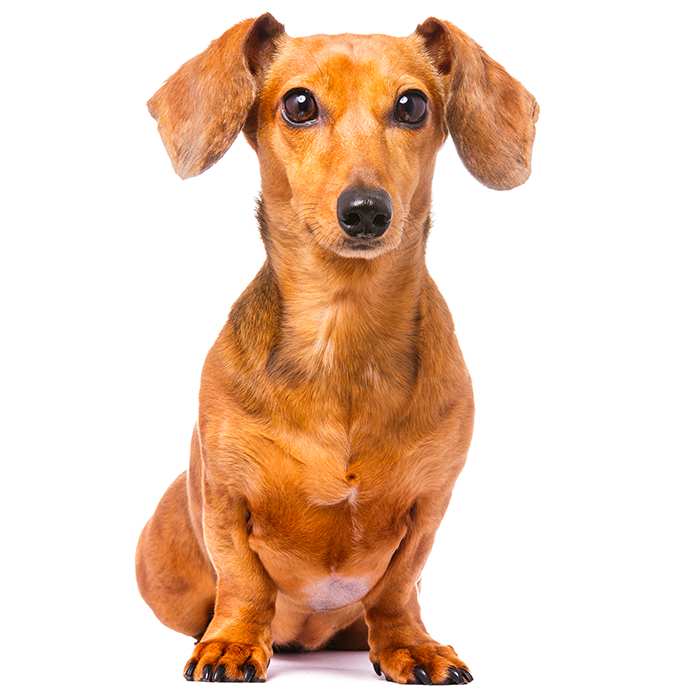Standard Poodle
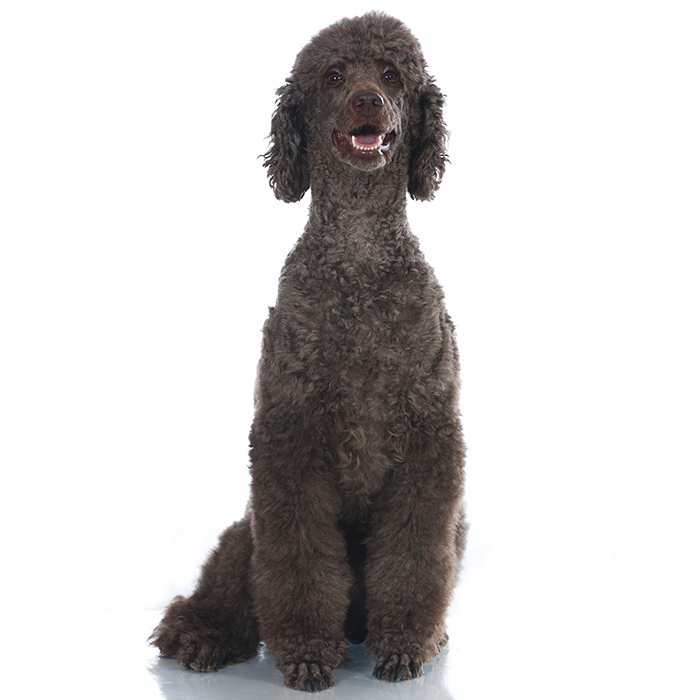

| Recommended for | Families |
| Breed Classification | Non-sporting group |
| Other names | French Poodle |
| Lifespan | 12 -16 years |
| Size | Large |
| Temperament | Active, loving, loyal |
| Intelligence | Very high |
| Tendency to bark | Medium |
| Maintenance Level | Medium-high |
| Health Risk | High probability of health issues during its lifetime, hence it is one of the more expensive breeds to insure. |
Insuring a Standard Poodle?
Get award-winning cover with more benefits and up to 80% of eligible vet bills reimbursed. Find out about your cover options.
Get a quick quote
Is this breed right for you?
Try our breed selector quiz to find out your best matching breed!
Insuring a Standard Poodle?
Get award-winning cover with more benefits and up to 80% of eligible vet bills reimbursed. Find out about your cover options.
Get a quick quote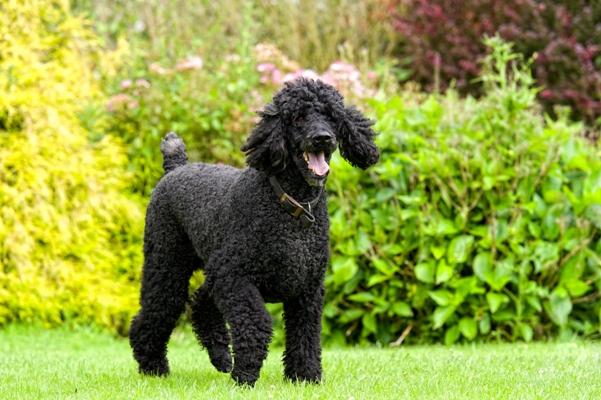
Breed history of Standard Poodles
While Poodles have been around for at least the last 400 years, and probably longer, the true origin of the Poodle remains the subject of heated debate. The French have officially claimed the Poodle as their own yet it is widely believed that its origins are in fact German. Originally developed as a hunting dog, bred to retrieve ducks and other water fowl from rivers and lakes, it is thought that the name Poodle is derived from the German word pudel meaning to play or splash in water.
The hairstyles the Poodle is known for have their origins in the poodle’s early hunting days. Owners would shear the legs of the poodles to make swimming less difficult, leaving fur only on the joints to guard against the severe cold of the water.
The French know the breed as the Caniche, meaning ‘duck dog’, and the animal gained a huge amount of popularity in France for not only its hunting prowess but also its role as an entertainer. The intelligent Poodle was the perfect performing animal because of its high intelligence, attractive coat, elegant gate and high trainability.
The Poodle became very popular with the aristocracy and royalty throughout the 18th and 19th Centuries and the breed’s grandeur remains somewhat intact today as an iconic symbol of high status.
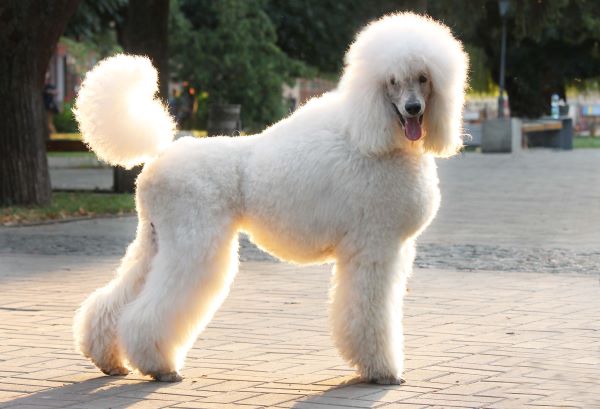
Physical description of Standard Poodles
The Standard Poodles are the largest of the Poodle types, measuring 38 cm and over at the top of the shoulder. Most standard Poodles are actually considerably taller, measuring between 53 and 68 cm to the shoulder top.
The Poodle has an athletic body and a thick, curly, non-shedding coat that grows profusely all over the body.
Poodle can be any solid colour including black, white, cream, brown, silver, blue, and apricot.
| Weight range | 21 - 32 kg |
| Height range | Greater than 38 cm |
| Colours | Any solid colour including black, white, cream, brown, silver, blue, and apricot |
| Coat length | Long |
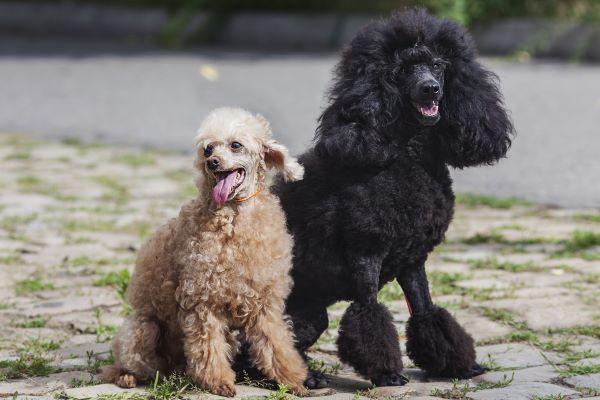
Standard Poodle personality and temperament
Poodles are very joyful, playful, alert and highly intelligent dogs with a loving, caring and kind nature. They love to feel like a part of the family and thrive on human companionship and interaction.
Their aristocratic and elegant looks may make them seem a bit posh, but in fact Standard Poodles just like to play and have fun. Given the chance they will happily roll in mud and go for a swim. Like the smaller Toy Poodle and Miniature Poodle, they are natural performers who love to please. Poodles enjoy the spotlight and make great circus and trick dogs who will thrive on the recognition of their talents. They will wow you with all the performance skills you teach them, and the louder the applause, the better the performance will be.
Like other breeds that were developed as hunting dogs, Standard Poodles require a great deal of both physical and mental stimulation, paired with a strong yet fair owner who won’t allow any misbehaviour. A Poodle that is well-managed and not spoilt will prove a great companion animal. They tend to get bored easily and a lack of stimulation can manifest in bouts of misbehaviour; for example, they may destroy shoes or dig up pot plants around the house. The breed also tends to develop separation anxiety, meaning regular and quality human contact is essential.

Standard Poodles with kids and other pets
Standard Poodles love human company and get along very well with children, being more patient and tolerant around kids than the Toy Poodle and Miniature Poodle. However, as they are a large sized dog, younger children should be supervised by a responsible adult as they could be accidently knocked over and injured by a boisterous Standard Poodle.
The Standard Poodle gets along well with other pets, particularly if they are raised together and properly socialised as puppies.
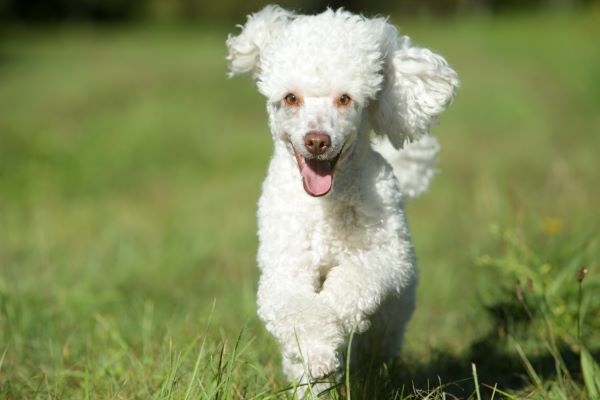
Standard Poodle training and exercise
Standard Poodles are very active dogs who benefit from regular, moderately vigorous outdoor exercise every day to suit their high energy level. They are eager for all kinds of activity and enjoy keeping busy.
Standard Poodles thrive on going for jogs or long walks with their humans. Bred as hunting dogs, their impulse is to retrieve, so tossing toys, sticks, or balls for them will provides physical and mental exercise. Most Poodles love to get in the water and swimming is not just fun but also great exercise for them. Throw a ball into a swimming pool and watch them go…
Poodles are highly intelligent and love to please, which enables them to be easily trained. Being agile and graceful as well as smart, they enjoy and excel at dog sports and obedience training. Their intelligence and athleticism are wonderful traits, but must be managed carefully. A Poodle that is well-trained and not spoilt will prove a great companion animal.
Training from an early age is the best way to avoid potential behavioural issues down the track. A Poodle does well with a strong, firm and fair owner who provides clear and consistent commands paired with fun and positive training routines.
| Energy level | High |
| Exercise requirements | High |
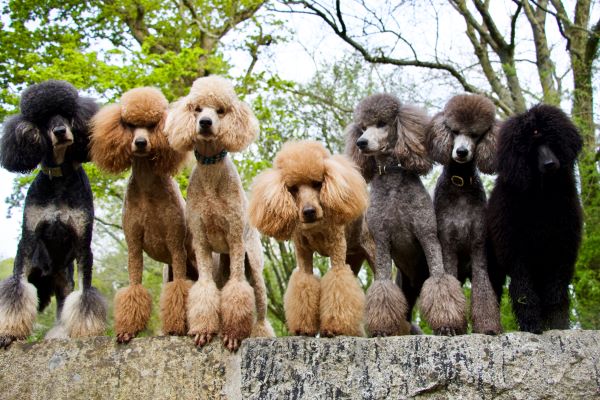
Standard Poodle feeding and nutrition
The Standard Poodle should do well on a high-quality, well-balanced diet that is appropriate to the dog’s age (puppy, adult, or senior), size and activity level.
Although they don’t tend to be greedy eaters, Poodles may become overweight, so it’s important to monitor their calorie consumption and weight level and adjust their diet accordingly.
To avoid gastric dilation and volvulus or ‘bloat’, don’t feed your Standard Poodle large meals. Spread the portions out during the day over two or three smaller meals and feed them at least an hour before or after any rigorous exercise.
Check with your vet if you have any concerns about your dog’s weight or diet.
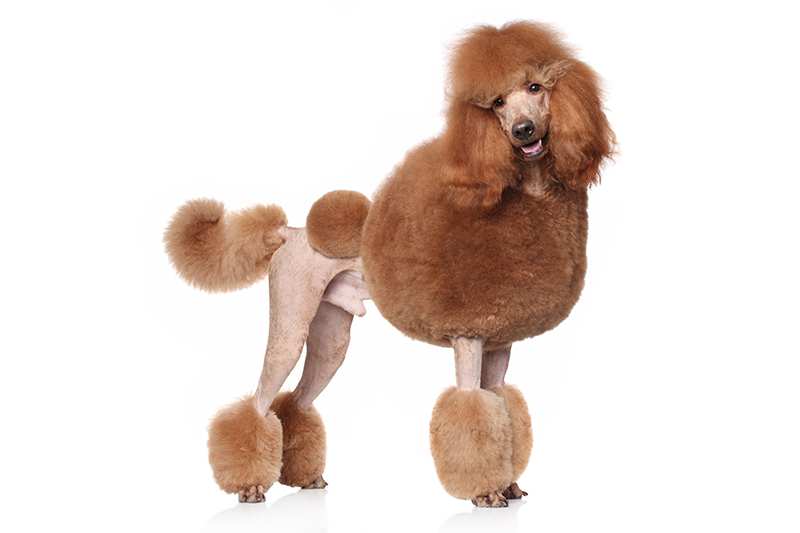
Standard Poodle care and grooming
The true Poodle coat does not shed like other dogs and is said to be non-allergenic. As the Poodle’s hair doesn’t stop growing, so you’ll need to learn how to give them a haircut or be prepared to take them for regular professional grooming.
Poodles require daily attention and regular brushing, bathing and trimming. Regular clipping (usually every 6 to 8 weeks) and a short trim can help to reduce the amount of work required. The coat should never be neglected as it will quickly become matted or tangled. Poodles are easily stressed and poor grooming has often resulted in nervous animals and skin irritations. Be sure to use only recommended shampoos.
The Poodle coat changes to a harsher, denser quality at around 10-12 months of age. During this period matting must be avoided with daily brushing and by keeping the coat short. The adult plush quality coat lends itself to easy trimming.
Health issues for Standard Poodles
- Von Willebrand’s disease causes clotting problems in the blood, which can cause excessive loss of blood after a cut, surgery or trauma and can result in a number of serious health issues. It’s recommended that you take your dog for regular vet check-ups because symptoms are hard to notice.
- Addison’s Disease, or Hypoadrenocorticism, is a serious illness that is caused by the insufficient production of adrenal hormones by the adrenal gland. Poodles with Addison’s disease may have a poor appetite, appear lethargic and vomit. The symptoms of this disease are not always straightforward and it can be difficult to diagnose because its symptoms are similar to those of many other diseases.
- Cushing’s disease, or Hyperadrenocorticism, is one of the most common endocrine disorders that affects dogs. It is characterised primarily by overproduction of the hormone cortisol. Excessive cortisol in an animal’s body can do a lot of damage and may be life-threatening. It usually develops in middle-aged to older animals (7 to 12 years old). The disease is often insidious and slowly progressive.
- Hypothyroidism, or under-active thyroid, is a condition where the thyroid gland doesn’t produce adequate amounts of thyroid hormone, resulting in a slower metabolic rate. Some symptoms of Hypothyroidism include abnormal weight gain, dry skin, hair loss, ear infections, and lethargic behaviour. Hypothyroidism is the most common hormone imbalance occurring in dogs, particularly affecting medium to large sized breeds, including the Standard Poodle.
- Gastric Dilatation and Volvulus are serious conditions, gastric dilatation or bloat being when the stomach becomes swollen with gas and fluid, while volvulus is the twisting of the stomach. The latter will prevent the dog from vomiting and is life-threatening when left untreated. Signs to look out for include retching without vomiting, enlargement of the abdomen and restless pacing, as well as whining or groaning when their belly is touched.
- Sebaceous adenitis is a hereditary skin condition that destroys the dog’s oil glands and, in some breeds, is associated with a severe oil discharge and hair loss. First appearing when the dog is a young adult, it occurs in Standard Poodles and possibly in Akitas. Early signs are a noticeable skin thickening, followed by the loss of normal hair kinkiness, and then progressing to patchy hair loss.
- Hip dysplasia is a hereditary condition and common in many breeds. The hip doesn’t develop as it should, leading to an instable or loose joint. This often results in prolonged limping and eventually lameness in later life.
Not all conditions are covered by Pet Insurance. For details of Bow Wow Meow Pet Insurance cover, refer to the Product Disclosure Statement.
Free engraved pet ID tag on sign up3
Customer Satisfaction
21 day cooling off
Easy to use Pet Portal

GapOnly® in vet claims
MORE INFORMATION
The Poodle Club of NSW Inc: http://www.poodleclubnsw.com/
Poodle Club of Queensland Inc: http://www.poodleclubofqueenslandinc.com/
Poodle Club of Victoria Inc: http://www.poodleclubofvictoria.com/
Poodle Club of South Australia Inc: https://poodleclubsa.com.au/

